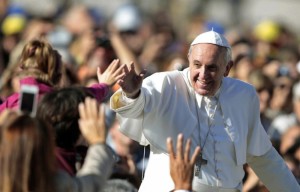
By editor - 24 June, 2016

Pope Francis begins his three-day visit to Armenia today and will visit the country’s genocide memorial in the capital Yerevan though he is expected to avoid using the word genocide during his trip.
The itinerary includes prayers at Tsitsernakaberd, widely known as the genocide memorial to the 1.5 million Armenians who were killed at the hands of the Ottoman Turks between 1915 and 1923 or who perished when they were forced into the Syrian desert by the Ottoman army.
The official programme for the trip, released by the Vatican, refers to Tsitsernakaberd as the “memorial of the massacres”.
A spokesperson for the Pope said the Armenian phrase Medz Yeghern, which translates as the “great evil” or the “great catastrophe”, was preferred to genocide.
Last year, Pope Francis acknowledged the Armenian genocide and this caused sparked a backlash by the Turkish authorities who recalled their ambassador to the Vatican.
The killing of Armenian Christians between 1915 and 1923 is known as the “first genocide of the 20th century”.
Last week the Pope asked the faithful to pray for his upcoming trip to Armenia.
“I ask you to pray for me, who in a few days will go as a pilgrim to an eastern land, Armenia, the first among the Nations to receive the Gospel of Jesus,” he said at an audience for the Reunion of Aid Agencies For the Eastern Churches.
On Thursday, Pope Francis sent a video message to the people of Armenia. In it the Holy Father says, “[It is] as a servant of the Gospel and a messenger of peace [that] I desire to come among you, to support [your] every effort towards peace – and I would share our steps on the pathway of reconciliation, which generates hope.”
The official welcoming ceremony will be held upon his arrival today at the Zvartnots International Airport, following which the Pope will travel to the Mother See of Holy Etchmiadzin, where a welcoming service will be offered in the cathedral.
In the evening, Pope Francis will meet with President Serzh Sarkisian, then with the authorities, community leaders, and representatives of diplomatic missions accredited in Armenia.
The first day will conclude with a meeting at the Mother See of Holy Etchmiadzin, with His Holiness Karekin II, Supreme Patriarch and Catholicos of All Armenians.
On the morning of June 25, Pope Francis will visit Tsitsernakaberd, the Armenian Genocide Memorial Complex and Museum in Yerevan.
Pope Francis, along with His Holiness Karekin II, will visit the city of Gyumri, where a Divine Liturgy will be offered in Vardanants Square.
The Pope will also visit Our Lady of Armenia Convent of the Congregation of the Sisters of the Immaculate Conception in Gyumri, then the Seven Wounds Saint Mary Church of the Diocese of Shirak of the Armenian Apostolic Holy Church and the Holy Martyrs Armenian Catholic Cathedral.
In the evening, an outdoor Ecumenical Service and Peace Prayer will be held in Yerevan in the city’s Republic Square.
On June 26, in the Mother See of Holy Etchmiadzin, Pope Francis will meet with Armenian Catholic bishops, and then participate in a Divine Liturgy and an Ecumenical dinner, along with His Holiness Karekin II, the Archbishops and Bishops of the Armenian Apostolic Holy Church, Armenian Catholic Archbishops and Bishops and the Papal delegation.
Pope Francis will also meet delegates and benefactors of the Armenian Church. His Holiness Pope Francis and His Holiness Karekin II will sign a joint declaration.
The spiritual leaders will offer their prayers at the Khor Virap Monastery, following which Pope Francis will depart for Rome.
This is Pope Francis’ 14th apostolic journey abroad.
Armenia, is a landlocked mountainous nation which borders to the west with Turkey, to the East with Azerbaijan, to the north with Georgia and to the South with Iran.
It was the first country ever to adopt Christianity as a state religion.
Pope John Paul II also visited the country in 2001.